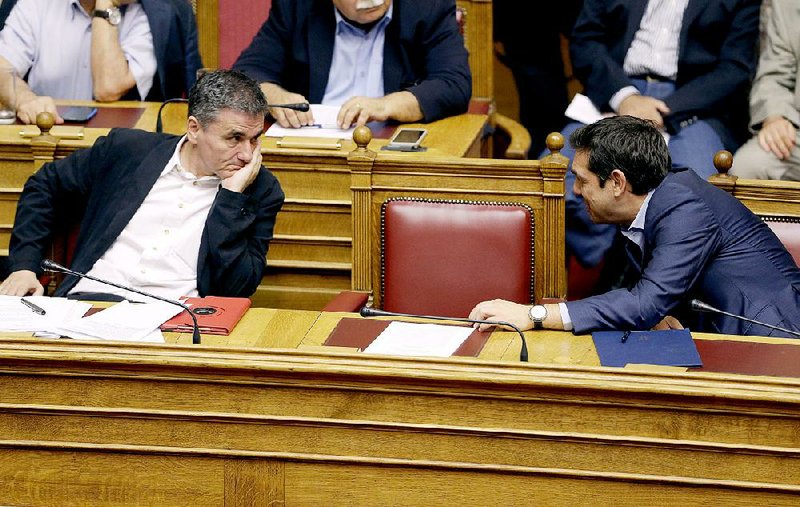ATHENS, Greece -- Greece's Parliament overwhelmingly approved a new batch of measures demanded by the country's international creditors early today, clearing the way for talks on a bailout to keep the country from total financial ruin.
Lawmakers voted 230-63 in favor of the measures after a whirlwind debate that ended at 4 a.m. Athens time. Another five members of the 300-seat house voted present, a kind of abstention.
Prime Minister Alexis Tsipras once again faced opposition from within his own leftist Syriza party but had no trouble passing the draft legislation with the backing of pro-European opposition parties.
The number of disaffected Syriza lawmakers, who see the economic changes as a betrayal of the anti-austerity platform that brought their party to power, shrank slightly compared with a similar vote last week.
The changes approved today were the final prerequisite before Greece can start negotiations with creditors on a third bailout worth around 85 billion euros, or about $92.6 billion At the current exchange rate, 1 euro equals about $1.09.
Greece has relied on bailout loans totaling 240 billion euros since 2010 after it was locked out of international money markets. It nearly crashed out of the eurozone this month after relations between Athens and its creditors hit rock bottom.
Addressing Parliament before the vote, Tsipras said the changes were a necessary price to pay to keep Greece alive after stormy talks with its creditors nearly collapsed earlier this month.
"We have chosen a compromise that forces us to implement a program in which we do not believe, and we will implement it because the alternatives are tough," he told lawmakers. "We are summoned today to legislate under a state of emergency."
Tsipras said approval of the bill would help Greece regain market confidence and tap bond markets again.
Before the debate got underway, about 10,000 people protested the measures outside Parliament. A few teenagers threw gasoline bombs at riot police, but no injuries or arrests were reported.
With the passage of the measures, officials said, negotiations with creditors are expected to start soon.
The government hopes the new bailout talks can conclude before Aug. 20, when Greece must repay a debt worth more than $3.27 billion to the European Central Bank.
On Wednesday, the central bank provided a vital cash injection to Greece's battered banks. A European banking official said the bank decided to increase emergency liquidity to Greek banks by $981 million -- the second such cash injection in under a week.
Fearing a run by depositors flocking to take their savings out of Greek banks, the government imposed capital controls more than three weeks ago, restricting daily withdrawals to 60 euros, or about $65, per account holder. Extra liquidity means that Greek banks will still be able to hand out cash.
The economic measures passed today are among the prerequisites Greece's European creditors have insisted upon for negotiations to begin on the third bailout for Greece.
Many in Tsipras' Syriza party, including former finance minister Yanis Varoufakis, voted against last week's austerity measures, which included a big increase to sales taxes that took effect Monday. But Varoufakis voted in favor of the new measures.
Syriza members opposing the bill included Parliament Speaker Zoe Konstantopoulou. In a letter to Greece's president and Tsipras before the vote, Konstantopoulou asserted that the measures were a "violent attack on democracy," arguing that lawmakers had been given very little time to study the voluminous bill.
Tsipras has accused party critics of acting irresponsibly.
The measures approved Thursday are aimed at reducing the country's court backlog and speeding up revenue-related cases. Greek lawyers associations oppose them, arguing that they will have the opposite effect.
Justice Minister Nikos Paraskevopoulos conceded that the government would have preferred changes to the measures, but he added that Greece is "in a state of emergency" and the alternative to accepting the proposal would be the country's forced exit from the 19-member group of countries that use the euro.
"Out of two problems, I chose the milder one," he said.
Lawmakers also approved changes related to banking union mechanisms, aimed at reducing the risk for European governments from bank crises.
In return for Greece's previous bailouts, successive governments have had to enact harsh austerity measures to try to get public finances into shape. Though the annual deficit has been reduced, the country's debt burden has risen as the Greek economy has shrunk by around a quarter.
Information for this article was contributed by Derek Gatopoulos and Raf Casert of The Associated Press.
A Section on 07/23/2015

